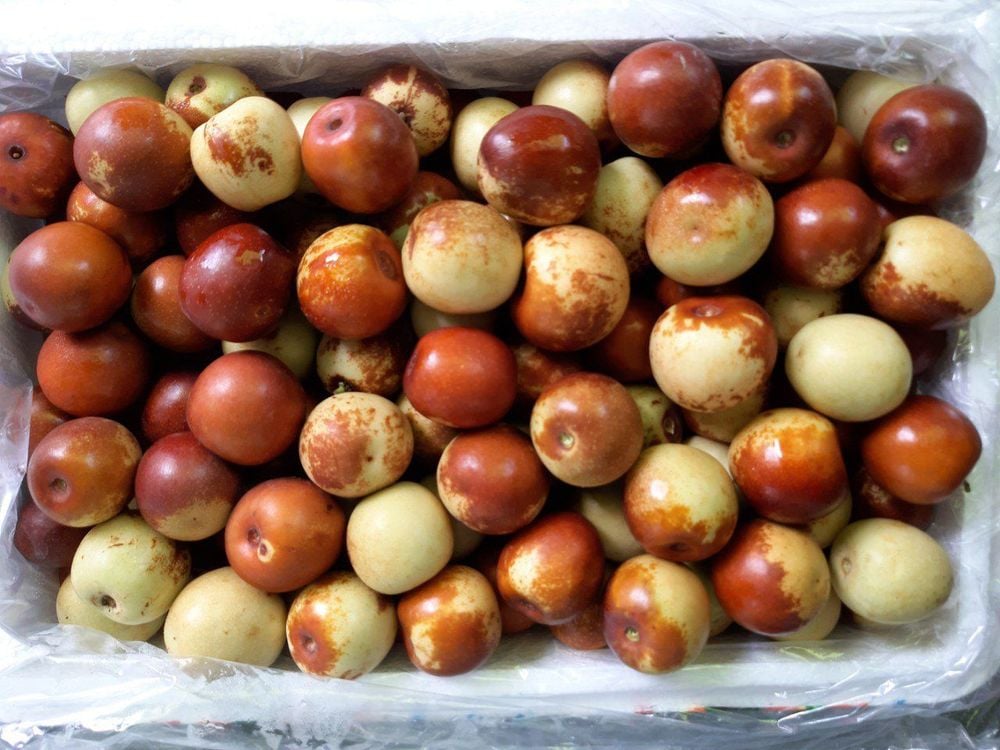This is an automatically translated article.
Jujube or berry is a sweet and spicy fruit commonly offered during the Maha Shivaratri festival. This wonder fruit is filled with amazing health benefits for you. The article will help you better understand the nutritional value, benefits and usage of jujube.1. What is jujube?
The jujube fruit, also known as the red date or Chinese apple, is native to South Asia but today has gained popularity around the world. These small round pods with seed holes grow on a large flowering shrub (Ziziphus jujuba). When ripe, they are dark red or purple and may be slightly wrinkled. Due to their sweet taste and rather chewy flesh, they are often dried and used in jams, confectionery and desserts in parts of Asia. In medicine, jujube has been shown to have many health benefits and is widely used to improve sleep as well as reduce anxiety. Here's everything you need to know about jujube, including its nutrition, benefits, and uses.2. Nutrition and health benefits of jujube fruit
2.1. Nutritional value of jujubes Jujubes are low in calories but rich in fiber, vitamins and minerals. A serving of raw jujubes weighing 100 grams, equivalent to about 3 fruits can provide:Calories: 79 Protein: 1 gram Fat: 0 grams Carb: 20 grams Fiber: 10 grams Vitamin C: 77% Recommended Daily Needs Potassium: 5% of Recommended Daily Needs Due to their high fiber content and low calorie count, jujubes are a great and healthy snack. They contain small amounts of several vitamins and minerals but are especially rich in vitamin C, an important vitamin with antioxidant and immune-boosting properties. They also contain a reasonable amount of potassium, which plays an important role in controlling muscle growth and electrolyte balance. In addition, jujube fruit also contains carbs in the form of natural sugars, which help provide energy for our body.
However, dried jujubes – like many other dried fruits, commonly eaten and used in cooking in many parts of the world, are much higher in sugar and calories than fresh fruit. During the drying process, the sugar in the fruit becomes concentrated, what's more, manufacturers may add additional sugar during processing.

Táo tàu là loại trái cây giàu chất xơ, vitamin và khoáng chất
Substance content High antioxidant: Jujube fruit is rich in several antioxidant compounds, mainly flavonoids, polysaccharides and triterpenic acid. They also contain high levels of vitamin C, which has the ability to act as an antioxidant. Antioxidants are compounds that can prevent and reverse damage caused by excess free radicals. The damage of free radicals is thought to be a major cause of a number of chronic diseases, including type 2 diabetes, heart disease, and some cancers. Because of their ability to fight free radicals, these antioxidants may offer a number of health benefits. An animal study found that the antioxidant activity of flavonoids in jujube helped reduce stress and inflammation caused by free radicals in the liver. In fact, most of the benefits of jujube berries are attributed to their antioxidant content. May Improve Sleep and Brain Function: Jujube fruit is widely used in alternative medicine to improve sleep quality and brain function. Several recent studies suggest that their unique antioxidants may be responsible for these effects. Jujube seed and fruit extracts have been shown to increase sleep duration and sleep quality in rats. In addition, jujube fruit in the field of traditional medicine is also often prescribed for patients with insomnia or anxiety disorders. Furthermore, animal and test-tube studies have shown that it can improve memory and help protect coated brain cells from damage caused by neurodestructive compounds. Research in mice has even shown that jujube seed extracts may help treat dementia caused by Alzheimer's. However, more human studies are needed to fully understand how jujube extract may affect your brain and nervous system. Can enhance immunity and fight cancer cells: Jujube can strengthen immunity and fight the growth of cancer cells. One test-tube study noted that the polysaccharides in jujube, which are natural sugars with antioxidant properties, can fight free radicals, neutralize harmful cells, and reduce inflammation. Reducing inflammation levels and neutralizing free radicals may help prevent chronic diseases, such as type 2 diabetes. Another study found lignins in jujubes, a type of fiber with properties antioxidant, promotes the production of immune cells and accelerates the neutralization of harmful compounds by these cells. Additionally, in a study in mice, jujube extract boosted immune cells called natural killer cells, which can destroy harmful antigens if they enter the body. Jujubes are also known to be rich in vitamin C, which is believed to have powerful anti-cancer properties. One study in mice showed that high doses of vitamin C were able to kill thyroid cancer cells. In addition, test-tube studies have found that jujube fruit extracts kill certain types of cancer cells such as ovarian cancer cells, cervical cancer cells, breast cancer cells, and breast cancer cells. liver cancer, colorectal cancer and skin cancer. Researchers believe these benefits are mainly a result of the antioxidant compounds in the fruit. However, most of these studies were done in animals or test tubes, so more human studies are needed before firm conclusions can be drawn.

Táo tàu có nhiều lợi ích tuyệt vời cho sức khỏe
3. How to use and process jujube fruit
For most people, jujube is a safe food and can offer many benefits. However, for people who are taking the antidepressant venlafaxine or other serotonin-norepinephrine reuptake inhibitors (SSNRIs), they should avoid eating jujube, as it can interact with these medicationsBeyond In addition, a study in rats found that jujube fruit extract might enhance the effects of certain seizure medications, including phenytoin, phenobarbital, and carbamazepine. If you are taking any of these medications, you should discuss any possible concerns with your doctors before adding jujubes to your diet.
In summary, although jujubes are generally safe, they may interact with the antiepileptic drugs phenytoin, phenobarbital, and carbamazepine, as well as the antidepressant venlafaxine and other SSNRIs.
Jujube is small and sweet. When dried, they have a chewy texture and taste similar to dates. When ripe, these fruits have a sweet, apple-like taste and can be eaten as a nutritious snack. They contain a hole with two seeds, which should be removed before eating.
Dried jujube juice is also commonly sold as a dessert or eaten as a candy, especially in Asia. However, keep in mind that dried fruit is higher in calories than fresh fruit. In addition, they are a concentrated source of sugar, so you should limit them in your diet.

Nếu đang uống thuốc chống động kinh, bạn không nên ăn táo tàu
Jujube, aka red date, is low in calories, rich in fiber and other nutrients. Due to its natural antioxidant content, jujube may offer some health benefits, but more human research is needed. You should avoid this fruit if you take venlafaxine or certain anti-seizure medications. While both fresh and dried fruit juices have high nutritional value, keep in mind that dried fruit juices are higher in sugar and calories per serving, so it's best to enjoy them in moderation. .
Please dial HOTLINE for more information or register for an appointment HERE. Download MyVinmec app to make appointments faster and to manage your bookings easily.
References: healthline.com, timesofindia.indiatimes.com






